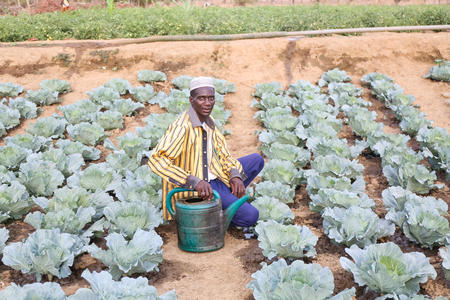After this rite of passage, the High-Level Political Forum must grow up

Seeing the world come together to review Sustainable Development Goal progress is still heartening, but, four years into Agenda 2030, is that enough? Savio Carvalho, WaterAid’s Global Campaigns Director, discusses what is needed for governments and the UN to step up.
Exactly four years ago this week, I was in the conference room as the Sustainable Development Goals (SDGs) were agreed at the United Nations in New York. It was a moment of hope and solidarity after a tedious journey of advocacy, struggle and campaigning to develop and instate this ambitious agenda.
The first HLPF cycle has been encouraging…
Over the past four years, culminating in the just-finished 2019 High-Level Political Forum (HLPF), the SDGs went through their rite of passage. At this conclusion of the first full cycle of review, I feel encouraged that 142 countries have now presented their voluntary national reviews and the 17 goals have each been reviewed through robust conversations and debates.
…but HLPF is not fulfilling its leadership role
However, the HLPF is tasked with the central role in overseeing the follow-up and review of SDGs progress at the global level, instructed to ‘Provide political leadership, guidance and recommendations for follow-up… promote system-wide coherence and coordination of sustainable development policies.’
Sadly, although the Forum should by now have found its feet in this regard, it has not yet delivered on this mandate, either in terms of policy guidance or much-needed leadership. While member states need to front this, the UN Secretariat also needs to take responsibility for the Forum’s sorry state. It must show leadership, put options on the table (in consultation with all stakeholders) and facilitate a process to help the HLPF deliver on its mandate. The HLPF and UN reform processes beginning at the September session of the General Assembly provide crucial opportunities for the Secretariat to bring proposals to the table and instigate some seismic shifts in how the Forum operates.
States’ hands are tied on crucial funding flows…
The other side of the coin is the lacklustre attitude of most member states, especially rich nations, to the ‘transformative’ (yes, transformative) ambition of the SDGs. Many are not recognising the power of this opportunity to effect change, and are not maximising it.
And change at the national level becomes difficult when countries are tied in knots that can only be loosened at the global level, beyond what individual states can control. For example, finding the money to pay for the SDGs requires renewed action on debt relief, domestic resource mobilisation (DRM), support to broaden tax bases and coordinated action to combat illicit financial flows. High-income countries need to deliver on their promises of overseas development assistance (ODA) targets, and on their binding mitigation targets, along with financing climate action.
Freeing up resources at the necessary scale also calls for new taxes on carbon and on financial transactions, along with the rapid phase-out of fossil fuel subsidies, with investment of this funding into meeting the SDG financing gaps in the universal provision of public services.
…but countries can act to improve planning, data and governance
At the national level, governments need to accelerate action for implementation of the SDGs. This requires a clear action plan, data to track progress and strengthening governance and accountability mechanisms at all levels. Strong regulatory frameworks for accountability of all actors involved in financing social development is of paramount importance. This includes private and public investors, lenders, and state and non-state actors.
Equally important is the role of society at large. Governments must engage with society to create open and transparent spaces to collaborate in the delivery of the goals. Transparent institutions help society to hold both state and non-state actors to account and states must view this as a feature of a healthy functioning system, not as a threat. Central to this is the protection of civic space and democratic discourse as fundamental to the creation of a level playing field for all of society.
The UN must take this opportunity to live up to its role
We are not yet done with the HLPF for this year, but the political declaration already agreed for the heads of states meeting (SDG Summit) in September is exemplary of the HLPF’s lack of ambition, policy guidance and leadership. Focus is given to consensus and communicability, with emphasis on communications and public relations.
Heads of state and governments must not let this opportunity pass with statements full of platitudes and political correctness. They must do this by showing real collective leadership, address conflicting priorities and trade-offs and ensure a strong and robust High-Level Political Forum (or a commission) that is not held hostage by a few states or private interests. Doing so will be judged as taking the planet and its people on a highway to disaster.
As the first cycle of SDG review ends, as the 2030 Agenda goes through its rite of passage, it’s high time to act. It’s time for the United Nations to live up to its role as a platform for standard setting, political guidance and global accountability.
The UN should be a place where everyone is both welcomed and challenged. If we are to get on track and achieve Agenda 2030, we must give it our very best and do things differently for the next stages – and final decade – of the Sustainable Development Goals.
Savio Carvalho is Global Campaigns Director at WaterAid UK. He tweets as @Savioconnects




